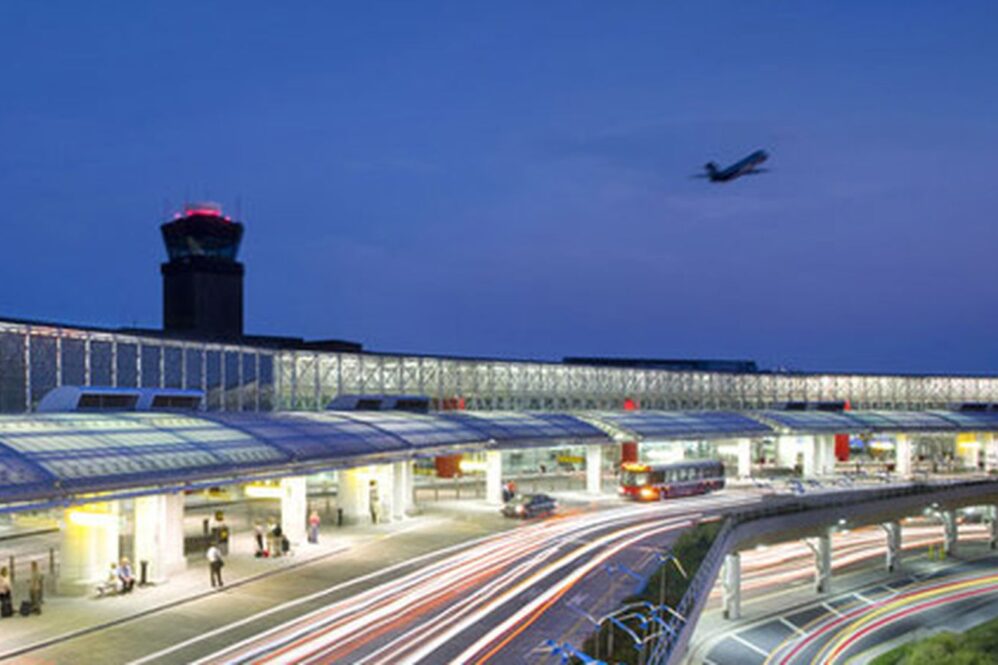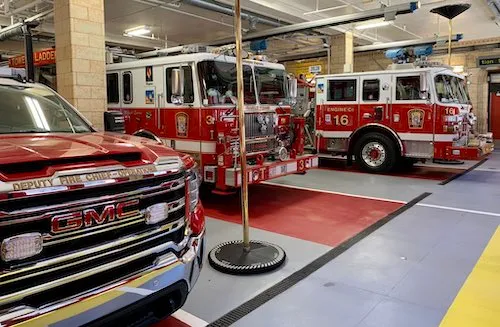MARYLAND MATTERS: Seven months after pulling the plug on a controversial process to find a company to run the concessions operations at BWI Thurgood Marshall Airport, the state is trying again.
Late Monday, the Maryland Department of Transportation issued a document known as a Request for Proposal, seeking bidders that want to oversee concessions at the state-owned airport for the next two decades.
“One of the Administration’s core ambitions with this solicitation is to connect with entrepreneurs, retailers, restauranteurs, concessionaires, and commercial developers who have the passion and vision to develop an airport concessions program of the future,” the state says in the document.
The previous bidding process for the lucrative deal, valued at millions of dollars, was halted soon after Gov. Wes Moore (D) took office, following complaints by some of the companies interested in the contract that the bidding had been tainted. Midway through the procurement process, which began in the summer of 2022, some of the requirements for winning the contract were changed in a way that appeared to favor one company, New Market Development.
In fact, the Maryland Aviation Administration last fall wound up recommending that the contract go to New Market Development, a company owned and operated by Major F. Riddick Jr., a veteran political player in Maryland who had once been chief of staff to former Gov. Parris N. Glendening (D). Following articles in Maryland Matters reporting on the concerns of some of the unsuccessful bidders, who complained about the integrity of the process, the Maryland Department of Transportation, parent agency of the Maryland Aviation Administration, announced it was pausing the procurement. At the same time, the current holder of the concessions contract filed a lawsuit seeking to block the aviation administration from taking its recommendation to the Board of Public Works, which awards high-dollar contracts for state government.
A month after taking office, Moore announced that he wanted the state to restart the procurement process altogether. But this time, the Request for Proposal is being handled by the director of procurement for the Department of Transportation, Joy Abrams, and not by the Maryland Aviation Administration, which came under significant criticism for its handling of the contract last year.
“Given the critical importance of this procurement to the Moore-Miller Administration, the Secretary’s Office — in coordination with the Maryland Aviation Administration — developed this solicitation, which will help ensure both the long-term competitiveness of BWI Thurgood Marshall Airport and economic equity through its award,” David Broughton, a Maryland Department of Transportation spokesperson, said in an email Tuesday.
Now that the Request for Proposal, or RFP, has been issued, there is a limit to what state officials and potential bidders can say about it publicly.
The transportation department has a new secretary under Moore, Paul J. Wiedefeld; the head of the Maryland Aviation Administration, Ricky D. Smith, is a holdover from the Hogan administration.
“The Airport is not only an air transportation center but an economic generator and a catalyst for growth,” the state says in its RFP. “The Administration is a customer-driven organization that delivers safe, sustainable, intelligent, and exceptional transportation solutions to connect people to life’s opportunities. Its vision is to ‘be better.’ The Administration’s primary responsibility is the operation and management of the Airport. The Administration’s goal is to provide excellent customer service for the traveling public utilizing the Airport. To achieve its goal, the Administration continuously seeks innovative commercial programs to accommodate the traveling public’s needs in a safe, satisfying, efficient, and convenient manner. Our motto is that we are the ‘Easy Come, Easy Go’ Airport.”
Airport concessions are big business and usually involve dozens of corporate entities providing a range of services. But most airports generally hire one contractor to coordinate the overall commercial operation, which includes food, drink, retail, and hospitality services.
The current concessions program at BWI covers 139 locations at the airport, under 65 subleases to approximately 50 business entities. The concessions at BWI generated a record $158 million in total sales in 2019. The figure dipped the next year, during the pandemic, but has spiked upwards since.
There are only about half a dozen or so major players in the national airport concessions market. Since 2004, the airport concession contract at BWI has been held by Fraport USA or its corporate predecessors. Fraport is a company based in Pittsburgh that’s a subsidiary of an international company based in Frankfurt, Germany. The contract has changed hands a few times, as ownership of the concessionaire has changed.
The Maryland contract originally went to a company called BAA USA, which created a subsidiary called BAA Maryland. BAA USA was a subsidiary of BAA, a British company. The company then changed its name to Air Mall when it ended its affiliation with the British company, and was later acquired by Fraport, which will continue to hold the contract until a new vendor is selected — or longer, if it wins the 20-year deal.
What’s changed
New Market Development, which Riddick launched in 2021 in anticipation of bidding for the airport concession deal, was not a nationally known player in the field — though Riddick had run and continues to run fast food outlets at BWI under a different corporate umbrella, and hired ex-Fraport executives for high-level positions in his new company. Riddick also has a food concession contract at Pittsburgh International Airport.
When the Maryland Aviation Administration issued its initial RFP last year, the document contained a provision that specified the company must have at least seven consecutive years in the business over the past decade, a standard industry requirement for long-term concessions contracts. As a year-old entity, Riddick’s company would not qualify.
Yet within weeks, the aviation administration amended its RFP to say that a company’s experience in the airport concessions business no longer had to be a determining factor in awarding the contract. Instead, the state decreed that the executives of the bidding company merely had to have seven consecutive years in the field over the past decade, a provision that industry experts last year described as highly unusual — and helped keep New Market Development’s bid alive.
In another amendment to the RFP, the aviation administration said bidders had to have all of their “minority business enterprise” subcontractors lined up in advance, before they submitted their bids to the state. Often, on contracts of this scale, bidders commit to meeting certain hiring and contracting goals before identifying which contractors they would use on a project. This was not an issue for Riddick’s company, however, because he is Black.
The new RFP includes a provision that a majority owner of a bidder for the concessions contract must have at least “seven consecutive years of experience within the last 10 years.” This suggests that New Market Development alone may not be able to qualify for the contract, but could team with another entity to win the bid.
The new RFP says the Department of Transportation expects to recommend a company to operate the 20-year contract in the spring of 2024, and the bid would be voted on by the Board of Public Works after that. Corporate entities that are interested in any aspect of the concessions operation at BWI have been invited to an informational session that the state is holding at the Maritime Institute Conference Center in Linthicum Heights, near the airport, on Oct. 11. A networking session will follow that evening.
Potential bidders are then invited for a tour of BWI a day later. Bids are due on Dec. 4.
Unlike the first RFP, issued when former Gov. Larry Hogan (R) was in office, this one requires contractors to commit to “labor peace,” per Moore’s order. This means the winning bidder has to agree to let airport service workers unionize and seek collective bargaining rights — but in exchange, the unions have to agree that their workers at the airport will not go out on strike.










